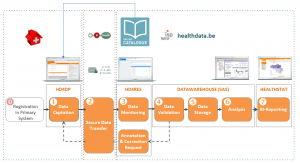Healthdata.be is a project of Sciensano, the former Scientific Institute of Public Health that makes knowledge, processes and applications available for the registration and storage of medical data. The eHealth Action Plan of the Minister of Public Health contains objectives regarding the reuse and efficient exchange of data between care providers, researchers and patients. The three important pillars are standardisation and homogenisation of data, as well as confidentiality in the distribution of said data.
When compiling registers that must be filled in by hospitals so research can be carried out on the (anonymous) medical data, it is extremely important to work with standardised terminology. From its extensive knowledge and experience with medical ontologies such as SNOMED CT, and with its extensive experience of working with language technology, Untranslate supported the mapping of labels and unstructured text to standardised concepts. For this purpose, an online platform was used that reliably recycles existing mappings and then submits suggestions from domain specialists based on lexical matching. The context of earlier mappings is also visible. Translation of the terms also takes place in the system so the registers can also be used in a multilingual way within the relevant information models (LOINC, Clinical Building Blocks, SNOMED CT, ICD, etc.). Predefined workflows support the entire process.
In addition, Untranslate also helped set up semantic search within FAIR, an open data platform built by Healthdata to make clinical trials available. FAIR stands for Findable, Accessible, Interoperable and Reusable, and the principles serve as a guideline for making scientific data suitable for reuse by both people and machines. For example, the search function within the portal was enriched with medical ontologies (SNOMED CT, EudraCT etc.), which means searching for synonyms also produces results. An automatically-generated background translation ensures the search function is also multilingual.
Would you like support or advice when structuring information or implementing Natural Language Processing for better knowledge exchange? Do not hesitate to contact one of our experts.


